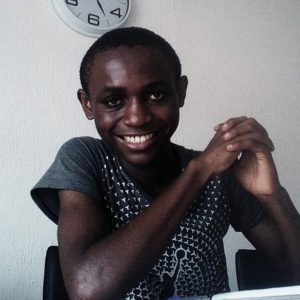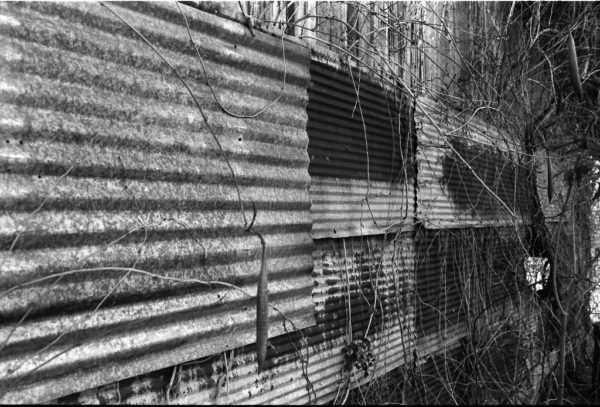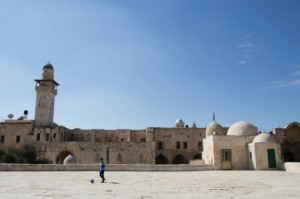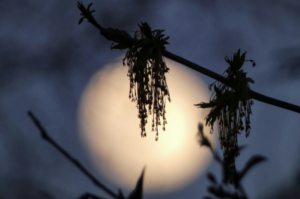“…long after the van had taken off…the cry of the prisoner still hovered in the air, like the aroma of absent food.”
Weariness descended on Ejindu like drizzles, slowly flushing out the leftover strength in him. It was this sense of crippling exhaustion that sickens you; that, like a duster making a smooth passage on a blackboard, wipes your mind clean and blank. But he was aware he wasn’t the only one. Like one sucking the juice out of an orange, the delay of the execution was also sapping the crowd of the eagerness that brought them to the public square. They were all getting tired, tired of waiting, of expecting. Around him, people bore boredom on their faces like emblems, and it showed in many eyes, this dimness caused by exhaustion, by a growing sense of disappointment. When they spoke, there was an evident emptiness, this waning enthusiasm which accompanied their short talks, which echoed in their lengthy whispers.
“Perhaps the white man thinks we are balls he can kick around anyhow,” a man said bitterly. Ejindu promptly glanced at the man — a slim fellow with an early bald and lips that were too black — and thought the man looked quite familiar. By God, the man was still saying, Could the white man please come and shoot these criminals once and for all?
Ejindu quietly moved away from the man; he didn’t like the way spittle flew out of the man’s mouth, like birds out of a nest, didn’t like how loosely some foamy stuff stuck to the edges of the man’s seemingly burnt lips.
“Someone just said that the soldiers are over there, behind that small shed, loading their guns,” another person said, pointing in a direction. Ejindu followed the man’s finger, but he couldn’t see the shed because there were too many people standing that way.
“And how long would it take them to do that — till night meets us here?” the man asked.
“It was this kind of delay that happened during the trial of those beasts,” a woman said. “The sun almost fell on us there. It was a terrible day, that day.”
Ejindu, along with his father and many other villagers, had witnessed the sentencing of the criminals at the Native Court. He didn’t think that day was a terrible day. Perhaps for the tried men, yes. But not for the spectators. The trial didn’t even take long to begin and had ended just as quickly as it had commenced. He still recalled the authoritative care the district magistrate, a heavily mustachioed Briton, had employed when he removed his glasses, dabbed his brows with a handkerchief, and put on his glasses again before reading his verdict that was interpreted by the court interpreter.
Ejindu had been astonished at how resolutely calm the criminals were, how they had behaved so indifferently, as though the court interpreter himself were speaking a foreign language, as though the sentence was being bestowed on some strangers who weren’t them. They appeared detached, distant — like their body was the only thing in the courtroom, and their spirits were elsewhere. But it wasn’t until the condemned men were led out of the courthouse by the police, in the direction of the police van, that one of them, as though the seemingly-foreign language had been mysteriously interpreted to him, as though he, somehow, now realized that the sentence was for him and his colleagues, had fallen on his knees and pleaded for mercy. It came with startling rage, the storm of boos and curses from the crowd, a damning voice rose above the din, telling him to go and plead with his mother’s pus-filled cunt. Ejindu thought it strange that long after the van had taken off, en route to His Majesty’s Prison, the cry of the prisoner still hovered in the air, like the aroma of absent food.
The criminals had struck untold fear into the hearts of many. They had raided farmlands and killed people in their sleep. Their last victim had been a girl who’d roamed the streets in the mornings, selling hot okpa. First, they had forced the girl to chew pebbles. Then they spread her legs and did some horrible things to her, before smashing her head with a club. No one knew whether she was dead or alive when they cut her throat, her blood spattering on her dress, on her steaming okpa.
But, at the moment, Ejindu wasn’t really interested in the criminals: they were merely victims of their own lives. All his emotions, all his frustration and anger and disappointment, were charged towards the British District Officer. He would try to shrug it off, pretend that everything was fine, that he was only there to watch the criminals get shot, just like everyone else. But he doubted his ability to cast it all aside in one desperate sweep — the stories of the villagers, his endless daydreams, his lofty hopes, and the high expectations that had come crashing, like a sand-house tread upon by a reckless foot.
Many stories had been about the District Officer. Everywhere you went — the market, under the shed of palm trees, the solitude of streams, the village school and inside the uncompleted brick church — everyone in the village was telling stories about the white man. Stories that stood ears up. His reputation of shooting and hanging criminals preceded him. But he wasn’t a bad administrator after all — at least he was not as cruel as the Owerri District Commissioner, Douglas, who was well known for riding the natives like horses and fucking people’s wives. This District Officer was different. He rode nobody and seemed too preoccupied with shooting and hanging criminals to have time for anybody’s wife. People had physical descriptions of the District Officer. He was tall, and when the natives said tall, they gestured at the tallest tree around to drive their point home. Others said he was tall alright but not that tall. They said his hair was the color of the falling sun. People said his eyes were something either blue or green, or a mixture of both. But he was way too handsome for a human being, all the stories agreed. The villagers said he had a striking smile that could make birds sing.
But here Ejindu was, staring at the District Officer, and his disappointment was enough to last one for an entire lifetime. Not only did the white man look like he spent forty days and forty nights with Jesus in the wilderness — hungry and sick — he looked too mean. Ejindu doubted if this was the white man he often dreamt of, the man who came with smiles and wings of light.
A hand was nudging him, a voice whispering, “Hey, Ejindu. Look here.” Ejindu turned in the direction of the calm, familiar voice. “Are you okay?” his father asked.
Ejindu managed a nod.
“Don’t worry. We’ll soon be out of here,” his father said, patting his arm. Ejindu could see the exhaustion on his father’s face, could sense that the initial enthusiasm that had brought him to the square was gone in him. “But these people are wasting time,” he said. “I have a box I need to fix at the workshop.”
Close by, while his hands were busy lighting a cigar with a matchstick, the District Officer was listening to whatever the District Interpreter was saying. When he was done, the District Officer flipped the smoking matchstick away, then turned to the black chap and said something only the interpreter understood. The interpreter innocently shook his head, loyally saluted, and wordlessly crept away.
A wave of impatient murmurs abruptly swept through the crowd. This whole delay was getting out of hand, someone said, he wanted to know if the white man had postponed the execution or what? The soldiers — do their guns not have any damn bullet? But our machetes can still serve, another fellow said, one stroke and someone’s head would roll. A woman was asking why the District Officer would bring them out and keep them in the sun like wet crayfish.
Then a bugle rang, once, twice. Birds flew frantically from nearby trees, shedding leaves in their wake. The soldiers hurriedly assembled, lined up, before the District Officer. They swung their guns theatrically, quite impressively.
And someone was clapping: “Good one, boys, that’s a good one!” Excitement was returning to many faces, brightening many eyes.
The District Officer straightened the collar of his shirt, and with an intimidating air of self-importance, walked toward the stiff soldiers. He weighed them with a sixth sense, from head to toe, making quick mental notes.
“Their heads, blow their heads off!” someone screamed from the crowd, like a competent prompter reminding an actor of the most important line in a drama scene.
One of the criminals looked to the sky with misty eyes, and startlingly burst hoarsely into a church hymn:
The road is narrow
And full of danger
Jesus go with me
I cannot go alone….
“Even the devil knows the road is narrow,” the woman beside Ejindu remarked. She said something about one not knowing how hot fire was until it burned one.
On the snap of the District Officer’s finger, the soldiers took positions and fell on their knees. Cocked their guns. Aimed their long barrels at the stakes. Waiting for the supreme command.
Like blanket on a bed, silence descended on the square and quickly covered its length and breath — the kind of silence so fragile that it could break on its own. Time froze. At that moment, the world had the chill of an abandoned graveyard.
Ejindu felt his father’s abrupt grip on his wrist, pulling him closer, as though to protect him from whatever was about to come.
Then the ultimate order came with the wave of the District Officer’s hand.
And, within a breath, bullets grew wings and began to fly.
***
Trekking back to the workshop, Ejindu’s father exchanged hearty greetings with every Okafor and Onunkwo, waved cheerfully at every Ikonna and Nnedi they came across. They got to a farmland, and when his father suddenly stopped walking Ejindu thought he wanted to admire the cassava ridges, the spotless dewy green leaves. Maybe his father wanted to unzip his trousers and piss into the bush. But his father was facing him, his gaze as hard as the nails in his workshop. His father’s face was wooden — unreadable. Ejindu didn’t know if that was a good sign or if he should be nervous.
“What happened back there,” his father said with much slowness that suggested that he was picking his words. “Do you know why I didn’t let you watch those thieves go the way they did?”
Ejindu promptly shook his head. As soon as the soldiers began to shoot, his father had covered his eyes. And Ejindu had impulsively pressed his fingers in his ears until the earth-shaking gunshots, which seemed to go on forever, finally stopped, leaving a deathly silence in its wake. Until the crowd exploded into cries of joy and screams of triumph. As his father quietly pushed him through the cheering crowd, Ejindu heard a familiar voice — probably the voice of that bald man — saying something about a party in some chief’s house to drink over the death of the bringers of death.
“There are things,” his father said, “that a child should not see. There are things that bite the eyes.”
Ejindu nodded, thinking about bullet ridden corpses left at the mercy of the beaks of starving vultures. He wondered how long it would take before the corpses were taken away and buried in the forest by the police. The crowd at the square — would they ever disperse?
His father was saying, “It is not a good thing that those men had to end up the way they did — shot like wild animals, with everybody dancing. I shouldn’t be telling you these things, talking about death and bullets like we’re talking mangoes and bride price. But you are not too young to be wary. Are you sure you’re listening?”
“Yes, Papa.”
“You can’t die a beggar and expect to be buried like a chief; things don’t work like that.” His father sneezed, coughed, and as soon as he turned to spit into the farm, Ejindu looked away. “One of those men was my childhood friend, Okika. He was a brilliant boy back then at the mission school. He knew all the answers even before the questions were asked, that was how brilliant he was. Our white teachers in school praised him; they all said he will go places, and that those of us that sit at the back of the classroom will never amount to anything in life, na anyi agaro achita aja. Now, which places did he go? He wasted himself, all that promise gone. See how he died: a disgraced criminal!” He sounded pained. “Those men that were executed are failures in death. But the question is: did they fail alone?”
Ejindu was not certain he was expected to answer the question. But his father was staring deep into his eyes.
“Your teachers tell me you have a sharp mind, Ejindu. But having a sharp mind is not enough. The world is upside down today because most of us use our intelligence for evil, and not to fix things. I don’t want you — no matter what happens — to end up like those men. Now I want you to understand this, nna a. The saddest thing about failure is that no one fails alone. No one. If you fail in life, you fail altogether everyone that put his or her faith in you. And that is the greatest of all failures. I hope, for your sake, you remember that someday.”
Ejindu nodded again, although he was certain he would not remember, that he would forget once his father stopped talking and decided that it was time to move on. Sometimes words are like air, the whirl of the wind — felt only at the moment and never again.
**************
Post image by Steve Snodgrass via Flickr
About the Author:
 Olisa Onyekaonwu is 20. He studies Mass Communication at the University of Benin. His fiction manuscript was longlisted for the Saraba Manuscript Prize. He lives in Benin City.
Olisa Onyekaonwu is 20. He studies Mass Communication at the University of Benin. His fiction manuscript was longlisted for the Saraba Manuscript Prize. He lives in Benin City.










Wole Fash January 24, 2017 07:19
Didactic...